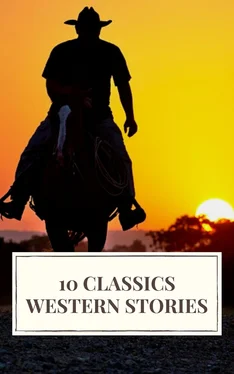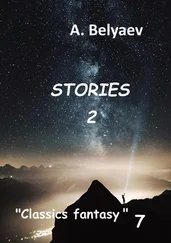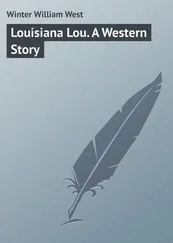How it happened he never knew, but she was clasped in his arms, his kisses were falling on brow and cheek in a passionate outburst that could be kept back no longer. At first, she trembled in his arms and shrank away from him; then she nestled close, as if sheltering herself in the love that was hers at last. After awhile she lifted a face over which a shadow of pain yet lingered.
“But you said I would bring you a curse; you feared—”
He stopped her with a caress.
“Even curses would be sweet if they came through you. Forget what I said, remember only that I love you!”
And she was content.
Around them the twilight darkened into night; the hours came and went unheeded by these two, wrapped in that golden love-dream which for a moment brings Eden back again to this gray old earth, all desolate as it is with centuries of woe and tears.
But while they talked there was on him a vague dread, an indefinable misgiving, a feeling that he was disloyal to his mission, disloyal to her; that their love could have but one ending, and that a dark one.
Still he strove hard to forget everything, to shut out all the world,—drinking to the full the bliss of the present, blinding his eyes to the pain of the future.
But after they parted, when her presence was withdrawn and he was alone, he felt like a man faithless and dishonored; like a prophet who had bartered the salvation of the people to whom he had been sent, in exchange for a woman’s kisses, which could bring him only disgrace and death.
As he went back to the camp in the stillness of midnight, he was startled by a distant roar, and saw through the tree-tops flames bursting from the far-off crater of Mount Hood. The volcano was beginning one of its periodical outbursts. But to Cecil’s mind, imbued with the gloomy supernaturalism of early New England, and unconsciously to himself, tinged in later years with the superstition of the Indians among whom he had lived so long, that ominous roar, those flames leaping up into the black skies of night, seemed a sign of the wrath of God.
Chapter 7 ORATOR AGAINST ORATOR.
The gravity, fixed attention, and decorum of these sons of the forest was calculated to make for them a most favorable impression.—Gray: History of Oregon .
The next day all the Indians were gathered around the council grove. Multnomah presided, and every sachem was in his place.
There was to be a trial of eloquence,—a tourney of orators, to see which tribe had the best. Only one, the most eloquent of each tribe, was to speak; and Multnomah was to decide who was victor. The mother of Wallulah had introduced the custom, and it had become popular among the Indians.
Cecil was in his place among the chiefs, with worn face and abstracted air; Snoqualmie was present, with hawk-like glance and imperious mien; there was Mishlah, with his sullen and brutal features; there, too, wrapped closely in his robe of fur, sat Tohomish, brooding, gloomy,—the wild empire’s mightiest master of eloquence, and yet the most repulsive figure of them all.
The Indians were strangely quiet that morning; the hush of a superstitious awe was upon them. The smoking mountains, Hood and Adams as the white man calls them, Au-poo-tah and Au-ka-ken in the Indian tongue, were becoming active of late. The previous night flame had been seen bursting from the top of Mount Hood and thick black smoke still puffed upward from it, and on Mount Adams rested a heavy cloud of volcanic vapors. Were the mountains angry? Aged men told how in the old time there had been a terrible outburst of flame and ashes from Mount Hood; a rain of fire and stones had fallen over all the Willamette valley; the very earth had trembled at the great mountain’s wrath.
As the lower animals feel in the air the signs of a coming storm, so these savages felt, by some kindred intuition, that a mysterious convulsion of Nature was at hand. They talked in low tones, they were subdued in manner; any one coming suddenly upon them would have been impressed by the air of uneasiness and apprehension that everywhere prevailed. But the chiefs were stoical, and Multnomah impassive as ever.
Could it have been that the stormy influences at work in Nature lent energy to the orators that day? They were unusually animated, at least for Indians, though a white man would have found them intolerably bombastic. Each speech was a boastful eulogy of the speaker’s tribe, and an exaggerated account of the wonderful exploits of its warriors.
This was rather dangerous ground; for all the tribes had been at enmity in days gone by, and some of their most renowned victories had been won over each other. Every one took it in good part, however, except Mishlah. When We-math, chief of the Klamaths, recounting the exploits of his race, told how in ancient times they had lorded it over the Mollalies, Mishlah glared at him as if tempted to leap upon him and strike him down. Fortunately the orator passed on to other things, and the wrath of the Mollalie chief gradually cooled.
Then came Cecil. It was a grand opening. He could speak of his own people, of their ancient savagery and present splendor, and show how the gospel of love and justice had been the cause of their elevation. Then would come the appeal to the Indians to accept this faith as their own and share in its uplifting power. It was a magnificent opportunity, the opportunity of a life-time.
But the mental conflict he had just passed through had rent his mind like a volcanic upheaval. It possessed no longer the intense concentration which had been the source of its strength. Tenderness, benevolence, missionary zeal, were still there, but no longer sovereign. Other passions divided his heart; a hopeless and burning love consumed his being.
He spoke, but the fire was gone from his delivery and the vividness from his imagination. His eloquence was not what it had been; his heart was no longer in his work, and his oration was a failure.
Even the Indians noticed that something was lacking in his oratory, and it no longer moved them as it had done. Cecil realized it, and strove to speak with more energy, but in vain; he could not arouse himself; and it was with a consciousness of failure that he brought his speech to a close and resumed his seat.
To a man of his morbid conscientiousness only one conclusion was possible.
“God sent me to proclaim salvation to these children of darkness,” he thought, “and I have turned aside to fill my heart with a woman’s love. His wrath is on me. He has taken his spirit from me. I am a thing rejected and accursed, and this people will go down to death because I have failed in my mission.”
While he sat absorbed in these bitter, self-accusing thoughts, the speaking went on. Wau-ca-cus the Klickitat made a strong “talk,” picturesque in Indian metaphor, full of energy. But the chief that followed surpassed him. Orator caught fire from orator; thoughts not unworthy a civilized audience were struck out by the intensity of the emulation; speakers rose to heights which they had never reached before, which they were destined never to reach again. In listening to and admiring their champions, the tribes forgot the smoking mountains and the feeling of apprehension that had oppressed them. At length Snoqualmie made a speech breathing his own daring spirit in every word. It went immeasurably beyond the others; it was the climax of all the darkly splendid eloquence of the day.
No, not of all. From his place among the chiefs rose a small and emaciated figure; the blanket that had muffled his face was thrown aside, and the tribes looked on the mis-shapen and degraded features of Tohomish the Pine Voice. He stood silent at first, his eyes bent on the ground, like a man in a trance. For a moment the spectators forgot the wonderful eloquence of the man in his ignoble appearance. What could he do against Wau-ca-cus the Klickitat and Snoqualmie the Cayuse, whose sonorous utterances still rang in their ears, whose majestic presence still filled their minds!
Читать дальше












